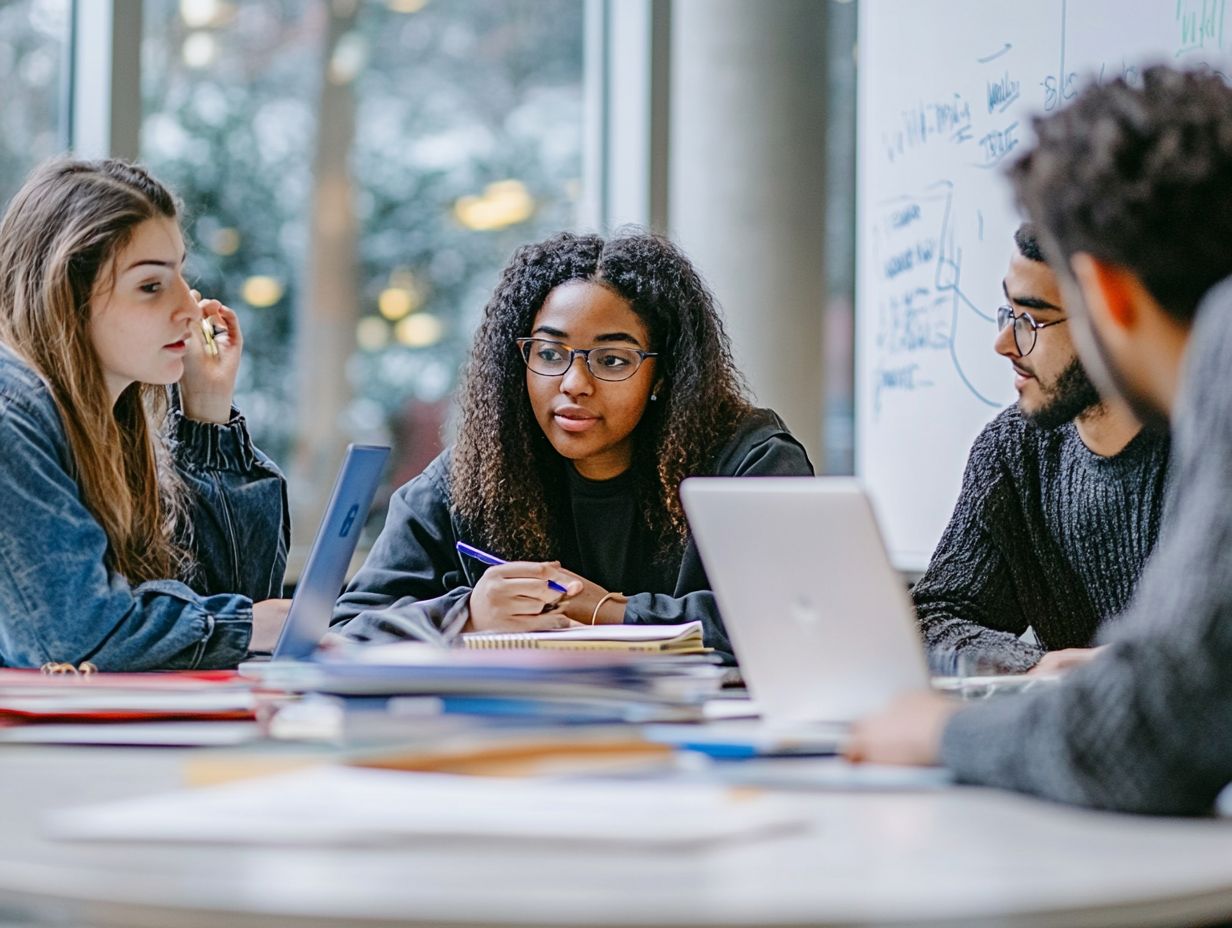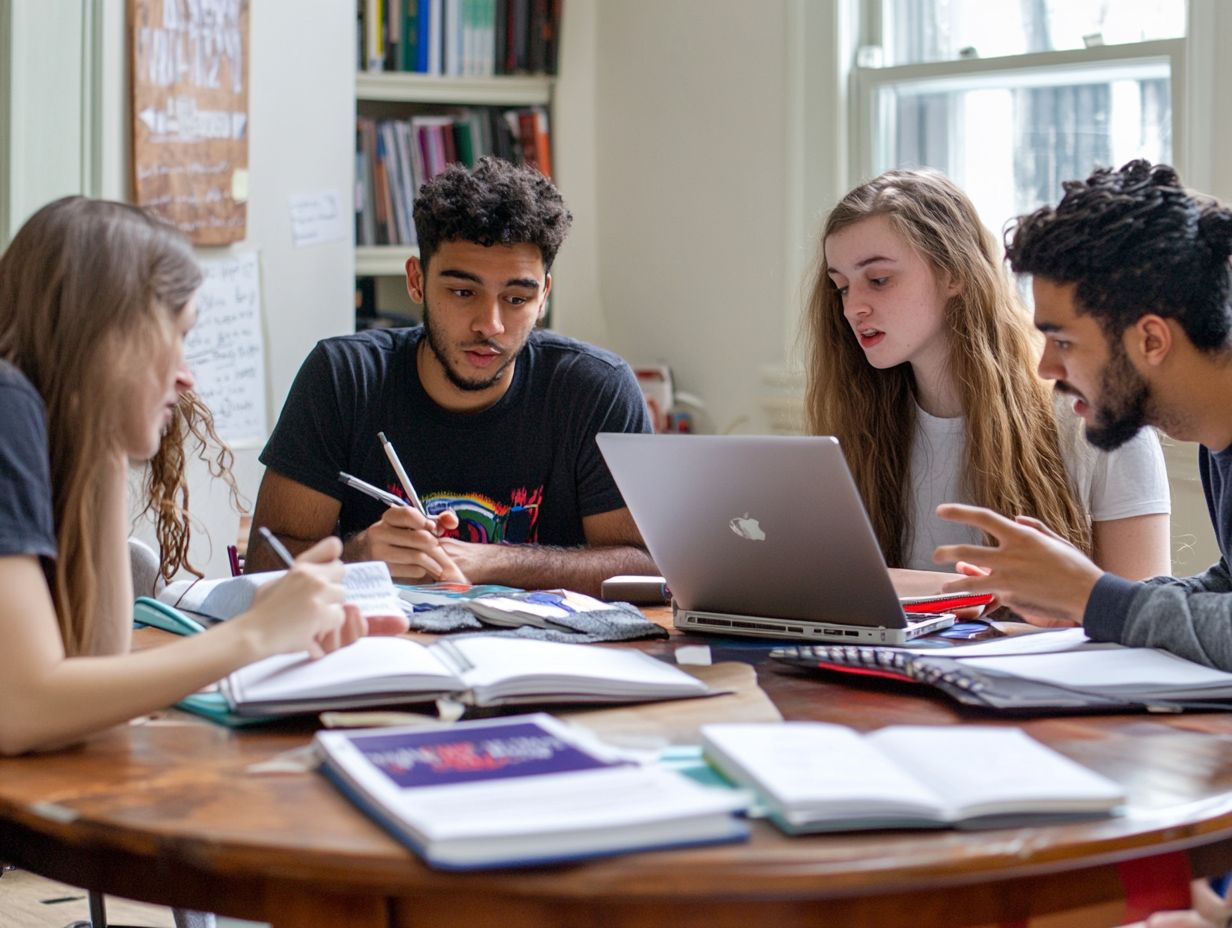critical thinking techniques for effective studying
Critical thinking is an indispensable skill in today s dynamic educational landscape, profoundly influencing how you analyze, evaluate, and engage with information.
This article delves into the significance of critical thinking in your studies, identifying common barriers that may impede this vital process while offering effective techniques to sharpen your analytical skills.
You ll find practical tips on seamlessly integrating critical thinking into your study habits, showcasing the many benefits it brings to your learning and retention.
Get ready to transform your study habits!
Contents
- Key Takeaways:
- The Importance of Critical Thinking in Studying
- Common Barriers to Critical Thinking in Studying
- Effective Critical Thinking Techniques
- Applying Critical Thinking to Studying
- Benefits of Using Critical Thinking in Studying
- Frequently Asked Questions
- What are critical thinking techniques for effective studying?
- Why are critical thinking techniques important for effective studying?
- What are some examples of critical thinking techniques for effective studying?
- How can critical thinking techniques help me study more efficiently?
- Can anyone learn and use critical thinking techniques for effective studying?
- How can I incorporate critical thinking techniques into my studying routine?
Key Takeaways:

Critical thinking is crucial for effective studying as it helps you analyze and evaluate information, leading to better learning and retention. It is important to identify and overcome common barriers to critical thinking, such as biases and assumptions, in order to improve study skills. Practical tips for incorporating critical thinking into study habits include asking questions, considering different perspectives, and seeking evidence to support claims.
The Importance of Critical Thinking in Studying
Critical thinking stands as a vital skill that greatly improves your thinking skills, empowering you to make informed decisions and tackle complex challenges in your academic journey.
Renowned educational theorists, such as Dr. Kathy Hirsh-Pasek from Temple University, emphasize that the capacity to critically evaluate information is essential for effective learning and personal growth.
By integrating critical thinking skills, as highlighted in Bloom’s Taxonomy, you can approach your studies with increased confidence and competence. This cultivates an environment where inquiry and deep understanding thrive.
Why Critical Thinking Matters
Critical thinking matters because it equips you with the essential reasoning skills needed to navigate the complex landscape of information. This is especially important in today’s social media-driven world where cognitive biases errors in thinking that can affect our judgments can cloud your judgment.
By embracing critical thinking, you can cultivate open-mindedness, enabling you to assess diverse perspectives instead of getting trapped in narrow viewpoints.
For instance, when you analyze news articles or social media posts, reflective thinking allows you to pinpoint emotional appeals or misleading statistics that might skew the information. This approach not only fosters a deeper understanding of various issues but also enhances your information literacy, giving you the power to distinguish between credible sources and unreliable ones.
In essence, developing these skills encourages a more thoughtful engagement with content, nurturing a healthy skepticism that ultimately leads to balanced opinions and well-informed decisions.
Common Barriers to Critical Thinking in Studying
Several barriers stand in the way of your critical thinking development during study, such as cognitive biases and challenges in processing information. These obstacles can impede effective metacognition and make it difficult for you to identify the underlying assumptions in arguments.
Identifying and Overcoming Obstacles

Identifying and overcoming obstacles requires you to recognize cognitive patterns that hinder effective problem-solving while fostering creative techniques that boost cognitive flexibility.
You may often face barriers like fixed mindsets that restrict your willingness to embrace challenges and explore new ideas. A lack of exposure to diverse viewpoints can impede your ability to fully engage with complex problems.
To counteract these issues, it s essential to cultivate an open-minded approach, actively seeking out differing opinions and experiences. Engaging in group discussions, brainstorming sessions, and reflective writing can significantly enhance your adaptability.
By prioritizing cognitive flexibility, you can sharpen your problem-solving skills, confidently tackle new challenges, and foster innovative solutions.
Effective Critical Thinking Techniques
Effective critical thinking techniques involve a sophisticated array of strategies aimed at elevating your analytical thinking, refining your ability to evaluate evidence, and cultivating structured arguments.
These skills are essential for enhancing your decision-making processes, allowing you to navigate complex situations with confidence and clarity.
Strategies for Analyzing and Evaluating Information
Strategies for analyzing and evaluating information are essential in academic settings. They empower you to discern credible sources and enhance your knowledge acquisition through effective thinking skills.
By incorporating various techniques, like using fact-checking tools and checking facts against different sources, you can significantly boost your analytical skills. For example, comparing information from multiple reputable publications helps you identify biases and inaccuracies.
Understanding the background of an author or organization adds valuable context that influences the credibility of the information presented. These thoughtful strategies not only deepen your comprehension but also empower you to make informed decisions, enhancing your problem-solving abilities in both academic and real-world scenarios.
Applying Critical Thinking to Studying
Applying critical thinking to your studies means embracing effective study habits that foster problem-solving, enhance your communication skills, and encourage meaningful self-reflection throughout your learning journey.
Practical Tips for Incorporating Critical Thinking into Study Habits

Incorporating critical thinking into your study habits involves practical strategies that promote reflective thinking and cultivate effective problem-solving techniques while appreciating diverse viewpoints.
By adopting an open-minded approach, you can significantly enhance your comprehension and retention of the material. One powerful strategy is to maintain a reflective journal where you articulate your thoughts on lectures or readings, creating a space to revisit and analyze your understanding over time.
Participating in group discussions exposes you to a variety of perspectives, encouraging deeper insights and challenging any preconceived notions. Regularly questioning your assumptions throughout the learning process stimulates a more nuanced grasp of concepts, ultimately enriching your educational experience.
Benefits of Using Critical Thinking in Studying
The benefits of employing critical thinking in your studies are numerous and profound. It enhances your learning and retention while improving your problem-solving abilities and communication skills. Additionally, it bolsters your capacity for evaluating evidence effectively.
How Critical Thinking Can Improve Learning and Retention
Unlock your potential! Engaging in critical thinking supercharges your learning and retention by fostering cognitive flexibility, which means adjusting your thinking to new information or perspectives, improving your problem-solving skills, and facilitating effective knowledge acquisition.
When you tackle challenging material, you naturally adapt your thought processes, considering multiple perspectives and approaches. For example, when confronted with complex mathematical problems, applying critical thinking strategies enables you to break the issue into manageable parts and explore various solutions.
This not only deepens your understanding of mathematical concepts but also enhances your ability to retain the information more effectively. In discussions, utilizing these methodologies encourages you to analyze arguments critically, question assumptions, and synthesize new ideas.
This process significantly contributes to your overall mastery of academic subjects.
Frequently Asked Questions
What are critical thinking techniques for effective studying?

Critical thinking techniques for effective studying are tools and strategies that help individuals think critically and analyze information in a systematic and logical manner. These techniques can help students understand and retain information, make connections and apply knowledge in real-world situations, and ultimately improve academic performance.
Why are critical thinking techniques important for effective studying?
Critical thinking techniques are important for effective studying because they go beyond memorization and help students develop a deeper understanding of the material. By using these techniques, students can actively engage with the content, evaluate information, and form their own opinions and conclusions.
What are some examples of critical thinking techniques for effective studying?
Examples of critical thinking techniques include brainstorming, concept mapping, problem-solving, Socratic questioning, and metacognition (thinking about your own thinking). You can apply these methods to subjects like reading, note-taking, and preparing for tests.
How can critical thinking techniques help me study more efficiently?
These techniques provide a structured approach to learning. They help you pinpoint important information and connect ideas, saving you from last-minute cramming.
Can anyone learn and use critical thinking techniques for effective studying?
Absolutely! Anyone can learn these techniques, regardless of age or skill level. With practice and dedication, you can enhance your critical thinking skills and improve your studying process.
How can I incorporate critical thinking techniques into my studying routine?
Start by figuring out which techniques resonate with you. Then, weave them into your study habits, like note-taking or exam preparation. Practicing these techniques with classmates or seeking help from a teacher can be beneficial.





